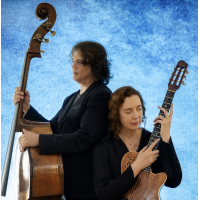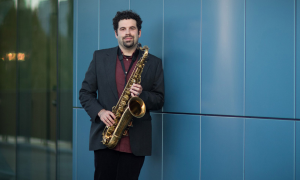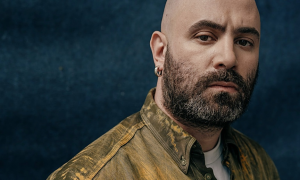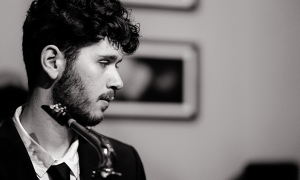Home » Jazz Articles » Take Five With... » Take Five with Guitarist Grant Gordy
Take Five with Guitarist Grant Gordy

Meet Grant Gordy
For many guitarists, landing a gig with bluegrass mandolinist David Grisman's groundbreaking bluegrass/jazz quintet would be the culmination of a career in music. But for Grant Gordy, it was more of a beginning, an apprenticeship in combining bluegrass and jazz that served as a launchpad for his own music. How far he has traveled since then can be heard on Peripheral Visions, his stunning new quartet recording and welcome successor to his eponymous 2010 debut.The New York City based guitarist and educator has emerged as a major voice on the American 'acoustic music' scene, and become one of the most highly-regarded young instrumentalists of his generation, performing in various collaborative capacities all over North America, Europe and in India. His music has been heard on NPR's All Things Considered and Tiny Desk Concerts and he's received attention from numerous international music periodicals like Jazz Guitar Today and Acoustic Guitar Magazine, both of which featured Gordy as the cover story for their respective March/April 2023 issues. He is described by The Fretboard Journal as "An exciting young player who, despite a plethora of influences, now sounds like nobody but himself."
Instruments
Acoustic and electric guitar.Teachers and/or influences?
I didn't go to school or take lessons when I was young, so I didn't have "teachers" in the formal or academic sense. But some important formative musical influences were my dad, David Grisman, Tony Rice, Kurt Rosenwinkel, Charlie Parker, Miles Davis, John Coltrane, Claude Debussy, Bach, Wes Montgomery, Bela Fleck, Shakti; later on Lage Lund and Peter Bernstein made a big impression on me in the modern jazz guitar realm.I knew I wanted to be a musician when...
As soon as I got a guitar, age 13. There was never a point where I said "I want to be a professional guitarist," but it became clear, eventually, that I wasn't interested in, or probably going to do, anything else. I've been thinking about something my friend Darol Anger said recently about being a musician: "it's not what we do, it's who we are." Kind of sums it up for me.Your sound and approach to music.
I came up in the bluegrass world. That might sound strange as a "jazz" musician, but the bluegrass scene is a good place to get on one's feet. There's a strong jamming culture, a strong aural tradition in the music, and among some sectors of the bluegrass community, a lot of openness to other styles of music. So I learned to train my ears pretty early on (a think I'm still working on always), and that informality and porousness of borders between styles has influenced my conception about music, what I listen to, how I write. I play a lot of acoustic guitar and am pretty experienced in playing in a string band ensemble, in addition to playing electric and loving standards and modern jazz. I think a strong grounding in triadic, functional harmony has been important for me, too, which comes from that bluegrass background.Your teaching approach
Connected to the last thing I said, my teaching tends to be a focus on fundamentals of rhythm, melody and harmony. I try to tailor this to individual students, but have found that pretty much every one, of probably hundreds of students at this point, is benefited by reinforcing basics of triads, functional harmony, ear training, metronome work, basic voice leading, and so on.Your dream band
This feels like kind of an impossible question to answer. Of course I'd love to get to play with Sullivan Fortner or Bill Frisell or Kurt Rosenwinkel or Brad Mehldau. Or Bird or Trane or Clifford Brown! The list is endless. There is no one dream band though. Bands—duos, quartets, whatever-are all different and, for me, are so dependent on musical chemistry.Road story: Your best or worst experience
I don't have a lot of superlatives; mostly it's pretty great to be able to travel and play the guitar and make friends in different parts of the world. I remember playing a festival once in a small village in Spain called Nofuentes. There was a lot to love about that gig, but one of the standout experiences—which has now stuck with me for years-was that the "backstage" area was just someone's garden. It was a beautiful summer evening, and for refreshments someone had laid out a small table full of individual "shots" of gazpacho for the band to have. It was totally delightful and I love moments like that.Your favorite recording in your discography and why?
So far, my latest one, Peripheral Visions. It feels like the most current statement of my abilities and process as a player and composer. I hope to feel that same way about the next record of original music I make, whenever that is.What do you think is the most important thing you are contributing musically?
I hope that my compositions are contributing something to the conversation. I hope that my music helps people to have open ears and acceptance to listen to things they might find unfamiliar. I try to keep my ears open and I hope that others are doing so too.The first jazz album I bought was:
The first jazz album I ever got wasMusic you are listening to now:
As I write I'm listening to Pharoah Sanders /Floating Points: Promises (Luaka Bop); also lately: Wayne Shorter: The All Seeing Eye (Blue Note). For the last few years I keep returning to Ron Miles: Rainbow Sign (Blue Note).Desert Island picks:
The above mentioned Ron Miles: Rainbow Sign (Blue Note)Thelonious Monk: Solo Monk (Columbia)
Marc Johnson: Sound of Summer Running (Verve)
Ray Charles: Ray Charles (Atlantic)
Emerson String Quartet: Debussy String Quartet in Gm (3rd movement) (Deutsche Grammophon)
How would you describe the state of jazz today?
Incredibly diverse, musically fertile. I don't have a grasp of the state of things as a whole, but: I just saw a movie about Thelonious Monk in the theater tonight, Samara Joy just won a Grammy, there's a proliferation of jazz education material all over YouTube, and people are out there trying new stuff and there are so many great players around. That said, it does seem like it's not getting easier for many people to make a living playing jazz.What are some of the essential requirements to keep jazz alive and growing?
That's the eternal question, or one of them. People talk about this a lot in the bluegrass world. When you continue to expand to include other elements or the influence of other styles, is it still "jazz" or "bluegrass?" When does it reach the tipping point and become something else? How much restriction or adherence to a code of tradition can a style or form withstand before it becomes a caricature or dies? There is no real answer to these questions as far as I can tell. It does seem important to me to love and study the language and the history. But I love standards, love learning bebop tunes, love transcribing and going to concerts and playing jazz gigs. Am I helping to keep it alive and growing? I don't know.What is in the near future?
I am going on tour soon in support of my new record, Peripheral Visions. It's just a short run here in the Northeast for now but I'm looking forward to playing this new music for several nights. I have a band called "Mr Sun" that just recorded our own interpretation of Duke Ellington's and Billy Strayhorn's "Nutcracker Suite." I'm really excited about that project being released and about performing those new arrangements.What is your greatest fear when you perform?
I think it's usually anxiety during the time leading up to a performance/tour/recording; I never feel like I know the music well enough, so I can get feeling down on myself, but I also push myself a lot as a result. Usually when the actual playing happens, I don't worry so much. I love playing and fear doesn't tend to come into it in the actual moment.What song would you like played at your funeral?
Something by Ray Charles, or "Song for Life" by Tony Rice, or that recording of "Abide With Me" from "Monk's Music." Hard to choose.What is your favorite song to whistle or sing in the shower?
I don't have a favorite, but the other day I was singing "Where is my Everything?" by a songwriter called Nick Lowe. A newly discovered song and I love it.By Day:
My day job is being my own booking agent, tour manager, travel agent, publicist...If I weren't a jazz musician, I would be a:
An out of work comedian.Tags
Take Five With...
Grant Gordy
AAJ Staff
David Grisman
Kurt Rosenwinkel
Charlie Parker
Miles Davis
John Coltrane
Wes Montgomery
Bela Fleck
Lage Lund
Peter Bernstein
Sullivan Fortner
Bill Frisell
brad mehldau
Clifford Brown
Pharoah Sanders
Wayne Shorter
Ron Miles
Thelonious Monk
Marc Johnson
Ray Charles
Samara Joy
duke ellington
Billy Strayhorn
PREVIOUS / NEXT
Support All About Jazz
 All About Jazz has been a pillar of jazz since 1995, championing it as an art form and, more importantly, supporting the musicians who make it. Our enduring commitment has made "AAJ" one of the most culturally important websites of its kind, read by hundreds of thousands of fans, musicians and industry figures every month.
All About Jazz has been a pillar of jazz since 1995, championing it as an art form and, more importantly, supporting the musicians who make it. Our enduring commitment has made "AAJ" one of the most culturally important websites of its kind, read by hundreds of thousands of fans, musicians and industry figures every month.























